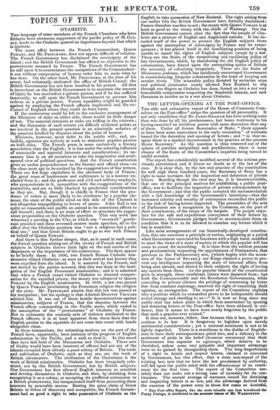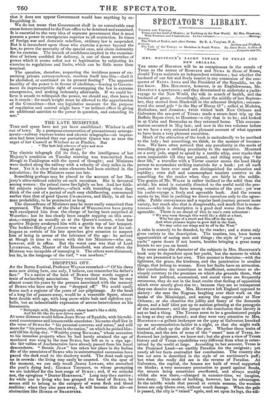THE LETTER-OPENING AT THE POST-OFFICE.
THE able and exhaustive report of the House of Commons Committee on the Post-office* strips the question of all personality. It
not only establishes that Sir JAMES GRAHAM has done nothing more than was done by all his predecessors, but bears testimony to his having exercised an invidious power with more discretion than any of them. Under all former Secretaries of State, "there appears
to have been some inattention to the early revocation" of warrants issued for the detention and opening of letters ; and "in that re spect there is a marked improvement in the practice of the present Home Secretary." As the question is thus removed out of the sphere of partisan antipathies and predilections, there is some chance of the fruits of the Committee's inquiries being turned to useful account.
The report has considerably modified several of the notions previously entertained, and it leaves no doubt as to the law of the case. It is clear that, by the law and practice of the constitution for well nigh three hundred years, the Secretary of State has a right to issue warrants for the inspection and detention of private letters. Startling though the view may be, it is incontrovertible, that one of the principal motives for establishing a public postoffice, was to facilitate the inspection of private correspondence by the Government ; and that the public accepted the accommodation
with a full knowledge of the Government's intentions—that the increased celerity and security of conveyance reconciled the public
to the risk of having letters inspected. The preambles of the acts of Parliament are a recognition by the Commons, on the part of their constituents, of the terms of the bargain. The people stipu late for the safe and expeditious conveyance of their letters by Government ; Government pledges itself to accommodate them on condition that it is to be allowed to examine any letters which it has in suspicion.
Like most arrangements of our historically-developed constitution, this one sanctions a principle or notion, originating at a period when Government exercised its functions with a high band, modified to meet the views of a state of society in which the popular will has come to count for something. It is clear from the earliest patents and proclamations respecting the appointment of Postmasters, that
previous to the Parliamentary xra, (which begins with the accession of the house of STUART) our Kings claimed a power to pre
vent any intelligence respecting the state of internal affairs from being sent abroad, and denied to their subjects the right of having any secrets from them. As the popular branch of the constitution grew in strength, these exorbitant claims were departed from ; but both the Commonwealth and the Revolution Governments, while conceding to private citizens the privilege of conversing by letter free from constant espionage, reserved the right of examining their epistles, on emergencies. The report of the Committee explains why a position which its researches prove to be indisputable should
sound strange and startling to us—" It is now so long since any public trial has taken place in which facts ascertained by opening and detaining letters at the Post-office have been adduced in evidence, that it seems to have been nearly forgotten by the public that such a practice ever existed."
It does not, however, follow, that because this is law, it ought to continue to be law. It is dangerous to legislate upon merely sentimental considerations ; yet a national sentiment is not to be lightly regarded. There is a sturdiness in the dislike of English
men to have their correspondence pried into, and a delicacy in the sentiment of pride in the belief (however erroneous) that their Government was superior to espionage, which deserve to be cherished, unless some very palpable and important advantage were to be gained by disregarding them. The long forgetfulness
of a right to detain and inspect letters, claimed or exercised by Government, has this effect, that a mere non-repeal of the existing law, now that we have the law proclaimed by authority, will fall upon the public mind with the offensiveness of an enactment for the first time. The report of the Committee certainly does not make out a strong case of necessity for its continuance. The annual average of warrants issued for detaining and inspecting letters is so low, and the advantage derived from the exercise of the power even in those few cases so doubtful, • This Post-office Report, like the molt valuable one that introduced the Penny Postage, im attributed tu the accurate Linos of M. WessuaTom
that it does not appear Government would lose anything by relinquishing it.
We do not mean that Government shall in no conceivable case cause letters intrusted to the Post-office to be detained and examined. It is essential to the very idea of supreme government that it must possess a power in emergencies superior to all restriction. In times of foreign war and domestic rebellion, ordinary law is suspended. But it is incumbent upon those who exercise a power beyond the law, to prove the necessity of the special case, and claim indemnity for its exercise. The breach of confidence implied in the examination of letters confided for delivery, is one of those stretches of power which it seems safest not to legitimatize by subjecting its exercise to regulations and limits, which can be little more than -nominal.
The question, therefore, respecting the invidious power of examining private correspondence, resolves itself into this—shall it be abolished, or continued on its present footing ? The apparent inutility of the power is in favour of abolition,—leaving to Governinept its imprescriptible right of overstepping the law in extreme emergencies, and seeking indemnity afterwards. If we could believe it unsafe to relinquish the power, we should say, then leave it as it stands : for much weight must be allowed to the apprehension of the Committee—that any legislative measure for the purpose of regulation and control might have "an indirect effect in giving an additional sanction to the power in question, and extending its use."



























 Previous page
Previous page